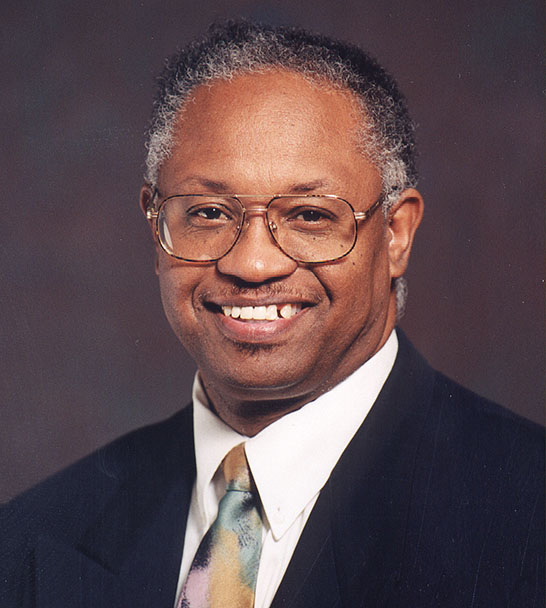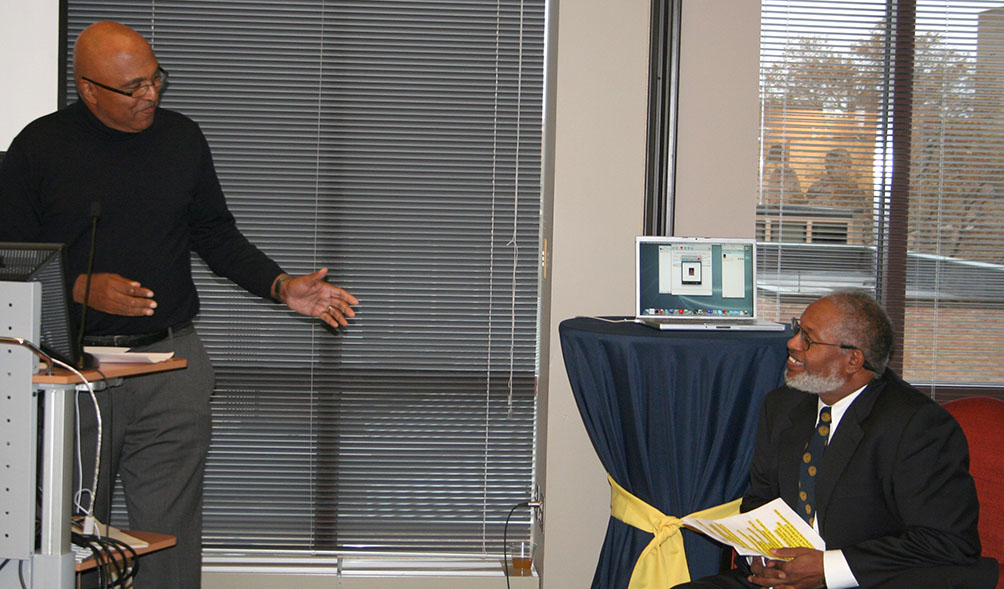Prof. Leo McAfee: Impacting Diversity – Changing Lives

 Enlarge
Enlarge
It was the late 1960s and students were demanding greater diversity on campus. The Dean of the College of Engineering, Gordon Van Wylen, had made it a priority to improve the numbers of underrepresented minorities in Michigan Engineering. And the Department Chair, Joseph Rowe, was pushing to hire a soon-to-be PhD in electrical engineering, Leo McAfee.
The timing seemed to be right, but Leo faced a hurdle to being the first African American faculty member hired in the College of Engineering. Then (and now), the College frowned upon hiring new PhD students out of Michigan. They have an unfair advantage, some said. They would benefit from first getting experience outside of Michigan, others said.
History was made January 1971 when newly-minted PhD graduate Leo McAfee was hired as an assistant professor, in defiance of general practice.
Leo McAfee received his bachelor’s degree in electrical engineering in 1966 from Prairie View A&M University, the first state supported College in Texas for African Americans. He thought he might like to go to Stanford for graduate school, but Michigan offered him a better financial deal with an NSF graduate fellowship. He thought his undergraduate classes matched up fairly well with Michigan, so when Prof. Larry McMahon called with the offer, he was Michigan bound.
His advisor was Don Calahan, a young faculty member and pioneer in computer aided network analysis and design. Leo’s PhD research was optimization of numerical models for semiconductor devices. He recalled running those early Fortran programs at 2am at the campus Computing Center to get the best run times. These were the early days of the Michigan Terminal System (MTS), a time-sharing computer operating system used by a consortium of eight universities from 1967-1999.
Prof. McAfee received his master’s degree in August 1967 and his doctoral degree in December 1970. His later research focused on numerical and circuit modeling of integrated circuits, networks for automated semiconductor manufacturing, and computer network devices.
Van Wylen’s decision to hire McAfee would impact the lives of many at Michigan as well as thousands of K-12 students, most of whom were underrepresented minorities and women. His retirement party was attended by many of those U-M students, including Prof. Rhonda Franklin (MSE PHD EE 1990 1995) via Skype and Prof. Rashaunda Henderson (MSE PHD EE 1994 1999). They saw Leo as a role model for their own future success and as a symbol of hope when times were tough. “I never knew I had that impact on students,” said Leo. “It was really nice to hear that.”

 Enlarge
Enlarge
David Tarver (BSE MSE EE 1975 1976) was McAfee’s tennis partner as they both learned to play tennis at Michigan. They played for hours several days a week during Tarver’s student days. Nearly two decades later, when Tarver had a thorny issue with his startup company in the mid 1990’s, he asked McAfee to look at the problem. Prof. McAfee spent his sabbatical applying his theoretical research to the problem of how many “lumped-sections” were needed to model and then maximize the cable response in David’s company, Telecom Analysis Systems (TAS).
“With my numerical model based algorithms, coupled with their verification with actual components, TAS could increase their cable emulation performance by a factor of 10, which opened up a whole new area of business for them,” recalled McAfee. In late 1995, Tarver sold TAS for $30M.
From the very beginning, Prof. McAfee was committed to improving diversity at Michigan. He went on many recruiting trips around the country during the 1970’s as a young faculty member, which led to him becoming the graduate admissions chair, a position he held for about 20 years.
During the mid-1970’s to early 1980’s, Prof. McAfee became the university-wide coordinator for the Bell Labs One-Year-on-Campus graduate program. In this program, Bell Labs would send newly-hired undergraduate students to Michigan in order to get their master’s degree in one year. The company not only paid for the students’ tuition, they matched the tuition dollars in a grant directly to the department.
Through this program, McAfee became the “hidden figure” behind about a million dollars in upgraded lab equipment for the department. This money kept the labs going during a period of extreme financial hardship that was felt by the entire College of Engineering.

 Enlarge
Enlarge
Between 1976-1979, McAfee was program director for the Program in Engineering Research and Teaching for Minority Students. He also became active with Detroit Area Pre-College Engineering Program (DAPCEP), a relationship he exploited as Education Director for the Center for Wireless Integrated MicroSystems (WIMS).
Between 2000 and 2010, in partnership with Michigan State University and Michigan Technological University, he and his WIMS colleagues produced more than 80 summer and academic year courses, attended by more than 4,000 pre-college students. He personally attended almost every Saturday morning DAPCEP outreach event. Also, through their Research Experience for Undergraduates (REU) programs, WIMS hosted about 75 undergraduate students over eight summers; several of the student research projects continued during the academic year. Over 80% of WIMS REU students subsequently enrolled in graduate study.
Alongside all this service activity, he also conducted his own research. The SECS Message Service (SMS) protocol, adopted as a standard by SEMI (Semiconductor Equipment and Materials, Inc) in 1989, was a direct result of the work of Professor McAfee and his students, and had an important impact on semiconductor factory automation.
Prof. McAfee retired in December 2010 after 40 years as a faculty member at Michigan. Family, friends, and former students came from all over the country to celebrate his career. Former students shared heartfelt stories about how he gave hope and encouragement when they needed it most. That came partly from seeing someone who looked like them – he was a role model. But it was more than that. Indeed, his soft cheerful Texan drawl is a mood lifter all by itself.
Prof. Ken Wise, Director of the WIMS Center, summed up the impact Leo’s programs had on K-12 students:
“He spent many days, evenings, and weekends making sure this program was successful, and he was especially dedicated to helping women and minorities get opportunities to grow and excel. Over 60% of those [4,000+] students were minorities and over 50% were women. And of those graduating from high school, over 60% have gone on to college careers in science and engineering. That is having impact–and that is changing lives.”
As honored as Prof. McAfee is to have been part of expanding opportunities for URMs in the STEM field, he is particularly proud of his own children. All three of his children earned a bachelor’s degree in engineering from Michigan. Two then earned Ph.D. degrees in engineering from other top universities in the United States, and the other earned a master’s degree plus an MBA.
 MENU
MENU 
